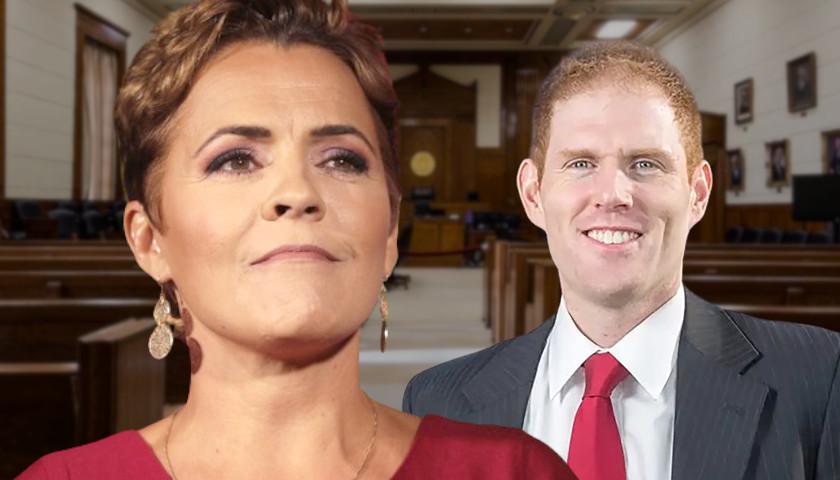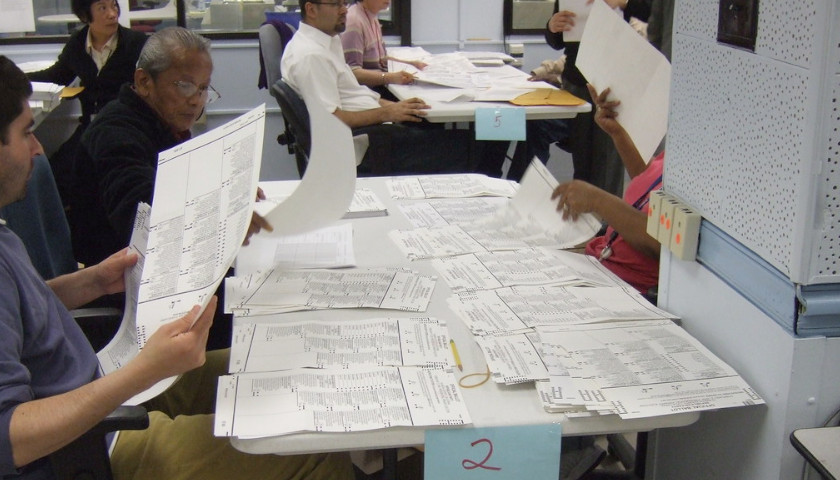A lawsuit brought by former gubernatorial candidate Kari Lake prior to the 2022 elections was heard by the United States Court of Appeals for the Ninth Circuit on Tuesday. Lawyers representing Lake, Arizona Secretary of State Adrian Fontes (D), and Maricopa County were in court at the Sandra Day O’Connor U.S. Courthouse in Phoenix before a panel of three judges.
Lake, alongside former Secretary of State candidate Mark Finchem, originally brought the lawsuit on April 2022, and it was dismissed in August. By December, a district court judge had awarded $122,000 in sanctions against the attorneys for Lake and former Secretary of State candidate Mark Finchem in the case, including against well known legal scholar Alan Dershowitz.
Judges Andrew Hurwitz, appointed by former President Barack Obama; Ronald Gould, appointed by former President Bill Clinton; and Patrick Bumatay, appointed by former President Donald Trump, heard arguments for the first time since the appeal was filed on December 28.
Andrew Parker, the attorney representing Lake, argued that the right to vote is guaranteed by the U.S. Constitution, providing Supreme Court cases as precedent and clarifying to the panel his position that vote tabulating machines in Maricopa County and Pima County were vulnerable, leaving votes open to be diluted or deleted from the system.
“The unreliable nature of what can occur when a malevolent actor intrudes into an election system and how the votes are being counted is what our complaint is all about,” Parker told the judges.
He later added that Lake’s complaint alleges such malevolent actors could gain access “to switch votes, to dilute votes, to add votes, to diminish votes, in an undetected way” and noted experts Lake’s team interviewed to make the determination.
In response to questions about Lake’s standing in 2023, almost a year after the election, Parker insisted that “standing is determined at the time of the complaint” and Lake “should not lose… the right to proceed” because of rumors she is considering a run for U.S. Senate.
Judge Hurwitz seemed to suggest that the lawsuit did not have merit, using a hypothetical about whether a similar lawsuit could be applied in an election known for having issues with voter fraud with hand-tabulated ballots.
Parker, in response, argued that the specific circumstances surrounding alleged vulnerabilities in Maricopa County’s election tabulating system posed a more significant threat than that of the average hand tabulation.
“People can get into the system through a number of different manipulations and vulnerabilities that have been testified to by serious experts across the country, and it’s being ignored by the courts, and the courts are shutting down review,” Parker said before the court. “Why? The courts should allow discovery.”
Parker then noted that Arizona’s voter registration system was previously hacked, questioning whether other systems may be vulnerable.
Kara Karlson, representing Fontes before the court, asserted that Lake’s case “is all speculation” and noted that all forms of vote tabulation are “susceptible” to manipulation to some degree.
“Any type of vote counting is susceptible to manipulation,” said Karlson, saying that no modern election could take place if the ability to manipulate a vote tabulation system were enough to disqualify it.
However, Karlson did seem to agree with Judge Hurwitz when asked if some legal relief could be offered in a similar scenario involving hand-counted ballots.
“If you had evidence that hand ballot voting had been subject to fraud and manipulation in Arizona in the past,” the judge asked Karlson, “could you attack the constitutionality of the hand ballot voting system in advance of an election?”
“Yes,” she replied, before later clarifying that a legal remedy could be a legal injunction against the illegal behavior, which “would be in state court versus federal court”
Representing Maricopa County, Emily Craiger agreed with Karlson, claiming that such an aggrieved party should “get an injunction to stop the conduct at issue.”
Craiger went further, however, claiming that “even if this alleged manipulation occurred” in the vote tabulating machines during the 2022 elections, “there is no evidence, or even a presumption, that a harm will come because of it.” She claimed the idea was “purely speculative,” and Lake “alleged no harm.”
In an appearance on Steve Bannon’s “War Room” before the hearing, posted to Lake’s account on X, formerly Twitter, she underscored the lawsuit’s April filing date.
“Seven months before the election, an Obama judge threw it out, dismissed the case, and then lo and behold we saw what happened in Arizona on Election Day in 2022,” said Lake. “We saw how the machines failed at an alarming rate, 59 percent, nearly 60 percent of the polling locations had failed machines. So we are appealing that original case, this could have huge implications, this could effectually get rid of these machines.”
The fake news never talks about any of our cases.
They act like everything's done. It's not.
Today, we are presenting our case against the use of electronic voting machines at the Ninth Circuit Court of Appeals.
Pray for a just ruling. pic.twitter.com/awDFHWV610
— Kari Lake (@KariLake) September 12, 2023
Lake added that she hopes “to prove even better today than seven months before the election is all of these issues that we have been able to document because of these machines that happened after the election.”
“It’s like we put our sacred vote into this black box, and we’re just told ‘trust us, this thing works, it counts accurately,’ but we know they don’t count accurately.” Lake added, “This is a really big case, it hasn’t been given a lot of attention, the mainstream media hasn’t talked about this case at all.”
– – –
Tom Pappert is the lead reporter for The Georgia Star News and a reporter for the Arizona Sun Times. Follow Tom on Twitter. Email tips to [email protected].
Photo “Kari Lake” by Kari Lake.





